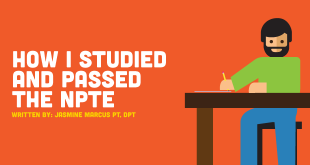I’ve been working as a full time physical therapist in an outpatient setting for 2 months. I was hired at the clinic where I completed my final affiliation, making my transition relatively easy. As a new grad, there are many obstacles, some of which you’ll most undoubtedly experience, but in the end can be great opportunities to grow and mature as a professional. Here are 3 things to expect that I’ve encountered in my first 2 months, and tips on how to handle them.
1. The Caseload
As a new therapist, I had to build a caseload. This involved completing a large number of evaluations, which in turned resulted in a ton of paperwork. I inherited a few patients from my colleagues and my first week was relatively light with only a few evaluations each day. The following week, the gloves were off, I was expected to begin establishing myself as a therapist and generating a case load.
Tips
1. If possible, take the evaluation notes on a computer (laptop or tablet). This will save you valuable minutes later on.
2. Streamline your process. Listen to the patient and ask relevant questions, but make sure you get answers for the basic eval questions. At the end of the subjective portion, I like to do a quick recap with the patient to make sure I have covered everything.
3. Take notes between patients. Take notes during lunch. Don’t fall behind.
2. Streamline your questions.
3. Don’t fall behind on notes.
2. The Question
“How long have you been a physical therapist?”
For some patients, your answer can turn them from a possible “rapid responder” to a “slow responder”. Rapid responders make immediate gains in therapy and instantly believe in your capabilities as a therapist. Slow responders, not so much. They can take awhile to warm up to you and may doubt your abilities to improve their function.
Tips
1. When asked how long I’ve been at the clinic, I respond with 6 months. I also let them know the first 4 months were as a clinical rotation, and I recently started working as a new grad 2 months prior.
2. Although you’re a new grad, remind the patient that your clinic is fantastic, and that you’re humbled that they recognized your skills as a new therapist to become a vital addition to their team.
3. Don’t forget about your clinical affiliations. When I’m asked how long I’ve been a PT, I always include my clinicals. You may not have been carrying a full caseload, but you did learn and develop real life skills.
– I’ve been working as a therapist for 2 months, and it feels great after completing ~1 year of affiliations to be able to put what I’ve learned to use.
3. The Frustration
I want to talk about two types of patients.
- The ones that frustrate you and you can’t fix.
- The ones that respond quickly and walk out singing your praises.
Ask any seasoned therapist. You can’t help everyone. This may or may not be related to your experience or skillset, but it’s a reality that we all have to face. It’s humbling, frustrating, and a great learning opportunity. I’m not saying to expect patients not to get better.
I’ve learned that the attitude with which you approach your patient will be reflected in the healing process.
What I want to convey is that if you’ve done your due diligence and nothing seems to work, reach out to a mentor, colleague, or supervisor.
Don’t feel defeated. I discussed one patient with a colleague and my frustration that he was not progressing very well. I found myself becoming less talkative with the patient as a result of my frustration. After making a few changes to the treatment program, we began to see results. With each session, the patient improved. I discharged the patient 2 weeks ago, and it was bittersweet. The patient wasn’t a rapid responder, but in the end walked out pain free and happy!
Everyday is a learning opportunity as I’m faced with daily obstacles. How you approach those obstacles makes all the difference. Hopefully these 3 insights will allow you to better prepare for when they arise and be a better therapist.
Let us know about your experiences as a new grad and how you handled them in the forums section or comment below.
 NewGradPhysicalTherapy.com The Largest Online Resource For New Grad Physical Therapists
NewGradPhysicalTherapy.com The Largest Online Resource For New Grad Physical Therapists






